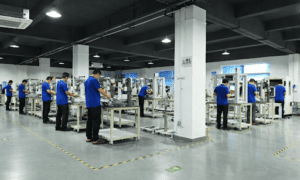Intel is considering selling at least a minority stake in its Altera unit in order to generate several billion dollars in cash for the struggling chipmaker.
TakeAway Points:
- Intel is searching for an investor who would purchase at least a minority stake in its Altera subsidiary, worth billions of dollars.
- Any agreement would aim to value Altera at least $16.7 billion, the amount Intel paid for the company in 2015.
- It is probable that Intel would try to find a company to acquire a majority stake in.
- Following a request for a security evaluation of the American chipmaker’s devices marketed in China by a significant Chinese cybersecurity association, Intel’s China division stated on Thursday that it has always placed a high priority on product safety and quality.
Intel’s minority investment
Intel is looking to sell at least a minority stake in its Altera unit in a transaction that would raise several billion dollars in cash for the struggling chipmaker, according to people familiar with the matter.
Intel is looking for a deal that values Altera at around $17 billion, said the people, who requested anonymity to speak freely about confidential information. Intel purchased Altera for $16.7 billion in 2015.
Following a steep drop in its stock price and an extended stretch of market share losses, Intel has been looking to make drastic changes. The company made overtures to a number of private equity and strategic investors this week about Altera, the sources said. Intel has expressed to some of those investors that it would be possible to acquire a majority stake in the business.
The sale process represents an abrupt change from Intel’s prior commentary on Altera. As recently last month, CEO Pat Gelsinger said that Intel’s leadership considered the business to be a core part of Intel’s future.
Intel’s previous plan to monetize Altera
Intel has previously said it could look to monetize Altera business through an IPO, possibly as soon as 2026. But the idea of taking strategic or private equity investment would be a marked acceleration of those plans.
Gelsinger and his leadership team have previously said that Intel understands its disadvantaged position and is working aggressively to remedy it. Selling a stake in Altera might allow Intel to more easily pursue its semiconductor fabrication ambitions and assure investors that it has a future as an independent company.
But the sale process also comes as Qualcomm has expressed interest in acquiring its onetime rival, a deal that would face fierce regulatory scrutiny and potentially reshape the semiconductor industry.
Intel shares have dropped 50% this year, as the company has been trounced by Nvidia in artificial intelligence chips and has lost share to Advanced Micro Devices in its core PC and data center market.
Intel China responds to accusations of security issues from Chinese cyber association
Intel’s China unit said on Thursday it has always prioritised product safety and quality, after an influential Chinese cybersecurity association called for a security review of the U.S. chipmaker’s products sold in China.
“We will maintain communication with the relevant authorities, clarify any concerns, and reaffirm our commitment to product safety and quality,” the company said in a statement on its official WeChat account.
A security review from China’s cyberspace regulator could hit Intel’s sales in China, which generated over a quarter of the company’s revenues last year.



































